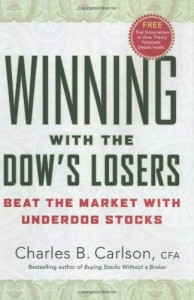In the course of his research, bestselling author and market expert Charles B. Carlson noticed a surprising trend in the 30 stocks that make up the Dow Jones Industrial Average - the worst-performing stocks in one year turned out to be among the best-performing stocks the following year. For example, the worst performer in the Dow in 1999 was Philip Morris, declining 57 percent during the year. In 2000, however, Philip Morris was the best-performing Dow stock, rising 91 percent and far outpacing the Dow's negative 6-percent return. Something similar happened with AT&T, which hit bottom in 2000 and bounced back in 2001. And Eastman Kodak, which was among the 10 worst performers in the Dow in 2001, was the best-performing Dow stock in 2002, gaining 26 percent versus a 15-percent loss in the Dow the year before. These simple observations, now backed by extensive research, have become the basis of a new and startlingly effective method of stock investing that is the subject of this book. Carlson's "worst-to-first" strategy yields amazing results again and again. In fact, if you simply invested in the worst-performing Dow stock each year beginning with $1,000 in 1983, your nest egg would have grown to an astounding $68,000 by the end of 2002. In contrast, an investment in the Dow Jones Industrial Average would have netted only $14,000. In Winning with the Dow's Losers, Carlson shows how an investor, with any size portfolio or any level of investment knowledge, can employ this simple, sound, and time-tested strategy to generate impressive wealth over the long term. Start with as little as $1,000. Invest in as few as 1 or as many as 10 Dow stocks. Review and adjust your portfolio no more than once a year. Achieve better results than the famous 'Dogs of the Dow' approach. Stock market fads come and go. Investors who chase them usually enrich their stockbrokers and not themselves. Not any longer. Now, with the help of Winning with the Dow's Losers, you can pick winning stocks year after year.
Winning with the dow’s losers
Sobre
Talvez você seja redirecionado para outro site












